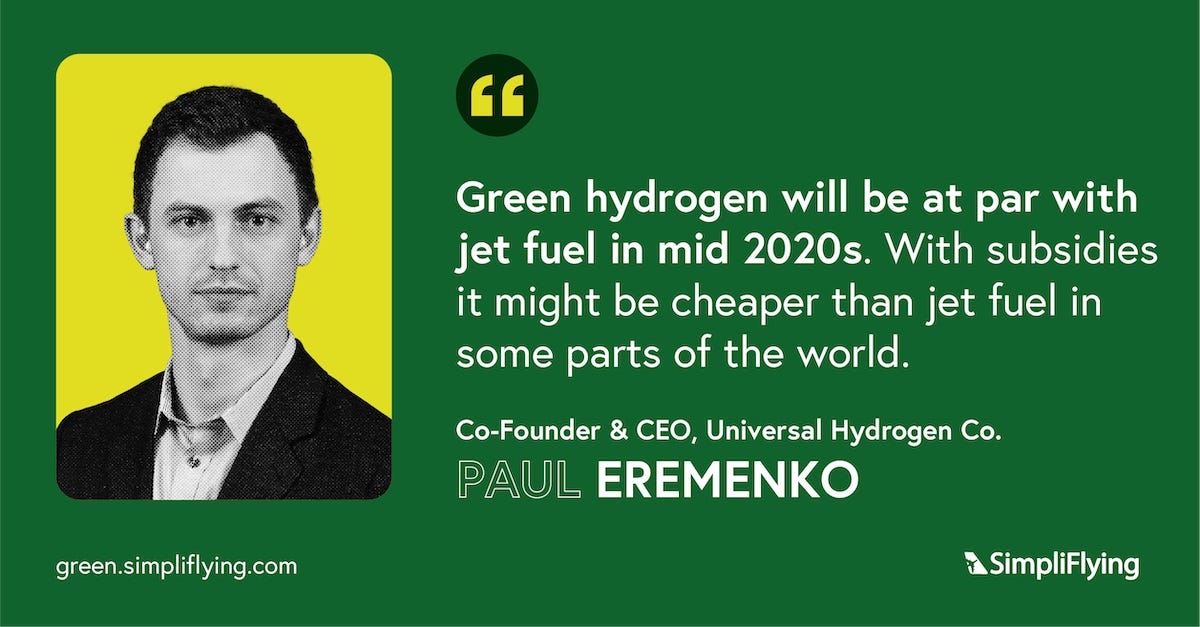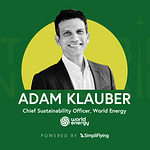In this episode of our ‘Sustainability in the Air’ podcast, we talk to Paul Eremenko, co-founder and CEO of Universal Hydrogen, a company that wants to make hydrogen-powered commercial flight a near-term reality.
Universal Hydrogen’s first product is a conversion kit for existing ATR72 and De Havilland Canada Dash-8 aircraft to fly on hydrogen. It includes a fuel cell electric powertrain and lightweight, modular hydrogen capsules transported directly to the aircraft. The company’s ultimate vision is “to build a global hydrogen distribution network that delivers green hydrogen to any commercial airport in the world at a cost far below that of jet fuel.”
“I like to analogise our business model to the Nespresso coffee model,” Eremenko says. “We’re not a hydrogen producer. We buy the hydrogen in the same way Nespresso doesn’t grow their coffee, they buy the coffee. They use the existing freight network to deliver that convenient form factor to the end user. We do exactly the same thing.”
Of course, in the beginning, Nespresso had pods but had no coffee machines in which you could use them. “They had to build the first coffee maker,” he says. “Otherwise, [the pods would be] completely useless. And so, for our first product, we are building the coffee maker, which is the retrofit conversion kit for the ATR-72.”
Today, you can choose from dozens of different Nespresso-compatible coffee machines, and that’s the same endpoint Eremenko wants to reach with hydrogen and aviation.
Here are the key highlights of the conversation:
What’s next for hydrogen airplanes? (1:55)
Universal Hydrogen’s focus on hydrogen fuel logistics (6:20)
Regional airplanes as proof points (20:27)
Developing clean-sheet aircraft? (29:43)
Universal Hydrogen’s retrofit conversion kit (30:28)
How universal hydrogen is different from other hydrogen engine companies (34:13)
How modularity is an under-appreciated architectural concept (42:24)
The problem with aviation emissions (46:59)
Rapid fire! (50:36)
Keep reading for a quick overview of the episode.
Why hydrogen can be a solution to aviation’s sustainability conundrum
Emphasising the value of radical changes over incremental improvements, Eremenko argues for exploring alternatives to conventional jet fuel. He makes a compelling case for hydrogen as a potential fuel source, capable of significantly reducing the aviation industry’s carbon footprint and helping meet global sustainability goals.
Eremenko strongly advocates for hydrogen as a future fuel source due to several reasons:
Sustainability: Hydrogen is a clean energy source, producing only water vapor and heat when used, thereby eliminating harmful emissions.
Availability: Hydrogen is the most abundant element in the universe and can be produced sustainably through the electrolysis of water using renewable energy.
Feasibility in Aviation: While Universal Hydrogen’s initial projects involve the Dash 8 and ATR72, their ultimate vision includes hydrogen-powered single-aisle aircraft. Though this would require a clean sheet aircraft, the company believes that the design would not be radically different from traditional airplanes. They also highlight the possibility of housing the necessary fuel modules within a modestly extended fuselage.
Modularity: Eremenko also emphasises that hydrogen fuel capsules’ modularity can integrate with existing intermodal freight networks, providing flexibility in refuelling and maintaining compatibility with current infrastructure.
Proof of Concept: His company’s work with hydrogen conversion kits for regional aircraft is an irrefutable ‘proof point’ for hydrogen’s feasibility, safety, and affordability as an aviation fuel. He believes this will set the stage for larger-scale aircraft to transition to hydrogen power.
This is not empty talk. In March 2023, Eremenko announced a new era in aviation after the successful 15-minute test flight of a Universal Hydrogen Dash-8 aircraft. Nicknamed Lightning McClean, this was one of the largest planes to be powered by a hydrogen fuel cell. This initial flight demonstrated the potential for hydrogen to fuel short-range passenger planes. This was followed by four more test flights.
Five radical ideas for a true zero emissions future
1. Unleash the hidden potential of modularity
Throughout the conversation, Eremenko consistently underlines the importance of modularity in innovation and technology, implying its critical role in his career and in various fields. In this context, modularity refers to a design approach that subdivides a system into smaller parts or modules that can be independently created and then used in different systems. This enables flexibility and efficient problem-solving.
Eremenko mentions how his work started with modular satellite architectures at DARPA, where they explored the concept of fractionated satellites. Moving to Motorola and Google, he developed the concept for modular smartphones, considering their potential for customisation despite the trade-offs like increased weight and decreased battery life. He highlights the power of an open third-party ecosystem of developers that comes with modularity. At Airbus, he worked on modular cabin configurations to enhance the passenger experience. Now, he’s applying these concepts to hydrogen modules for aircraft fueling, appreciating the compatibility with intermodal freight, despite potential weight increases.
“We are good at design for performance, design for cost, but not design for flexibility. And so modularity usually gets discounted, because it sub-optimises the system against performance and cost but it improves the flexibility.”
2. Green hydrogen will be viable in the future
Eremenko acknowledges the two main issues of green hydrogen: its high cost and limited supply. (Green hydrogen is generated by renewable energy.) However, he states that the cost of green hydrogen has been decreasing exponentially due to falling renewable electricity costs, while its production volume has been increasing. According to Eremenko, green hydrogen can also capitalise on off-peak electricity from renewable sources, which often goes wasted.
He explains that an electrolyser, which essentially operates as a reverse fuel cell, can create green hydrogen using renewable electricity. Moreover, the amortisation of electrolyser costs and higher production volume will make the trend sustainable.
Eremenko believes green hydrogen will reach price parity with jet fuel by the mid-2020s without subsidies. He also mentions the U.S. government’s subsidy program which supports green hydrogen production and predicts a significant increase in green hydrogen production capacity in the next two to three years.
3. Re-think the emissions reduction potential of SAF
Eremenko shares two reasons for the aviation industry’s reluctance to transition from Sustainable Aviation Fuels (SAFs) to hydrogen:
First, the industry's risk-averse nature makes it hesitant to alter aircraft or engine designs. (SAF is compatible with current designs and can be used as a “drop-in” fuel.) Instead, it relegates the responsibility of mitigating environmental impact to fuel producers, thereby treating SAFs as an offset scheme rather than a truly sustainable solution.
Second, Eremenko criticises the cost and sustainability of SAFs. Synthetic SAFs, he argues, will always be more expensive than hydrogen because they require hydrogen as a feedstock, along with the sequestration of atmospheric carbon.
While acknowledging SAFs as a viable near-term solution, Eremenko insists that hydrogen can effectively handle the bulk of aviation emissions, particularly in single-aisle aircraft due for redesign by the mid-2030s. For longer range missions, he suggests alternatives like ammonia or ammonia-hydrogen mixtures.
“The degree of sustainability of sustainable aviation fuels is very questionable. Functionally, a sustainable aviation fuel is the same thing as digging up fossil fuel, using fossil fuel and paying somebody to plant trees in the Amazon.”
4. Regional airplanes can be the gateway to true zero-emissions flight
Eremenko sees the use of hydrogen-powered regional aircraft as a proof-of-concept to demonstrate their safety and viability, aiming to overcome passenger acceptance hurdles. Despite these aircraft only making a small portion of aviation missions, they serve as a key step towards wider hydrogen adoption. Eremenko plans to prove hydrogen can be cost-effectively delivered to airports worldwide.
Looking ahead, Eremenko mentions that both Airbus and Boeing are targeting a 2035 entry for new aircraft to replace models like the 737 and A320. These aircraft will feature a longer fuselage to accommodate hydrogen and thinner wings without fuel, offering increased aerodynamic efficiency. Eremenko’s Universal Hydrogen aims to be a key player in this scenario as a provider of fuel services, working with potential leading partners such as Airbus and GE, which are developing hydrogen technology and have invested in Universal Hydrogen.
5. A permissionless business model
Eremenko is clear that Universal Hydrogen is not interested in developing its own clean-sheet aircraft but rather wants to focus on solving the hydrogen value chain problem. He sees the company’s role as a hydrogen fuel services provider and believes that stepping into aircraft production would be counterproductive, as it would mean competing with their own customers.
Regarding retrofitting, Eremenko makes it clear that retrofitting a single aisle aircraft with hydrogen is not feasible, and such a transformation would have to be a clean sheet design by the likes of Boeing or Airbus. Universal Hydrogen’s role would be as a fuel services partner.
The company is currently focusing on developing retrofit conversion kits for regional airplanes as mentioned above. Universal Hydrogen does not perform the aircraft modifications themselves but supports the MROs with training, work packages, and work instructions. Additionally, Eremenko mentions the potential for offering line fit capability in the medium term, so new aircraft can be equipped with their kit right from the factory. He notes that they’re having conversations with Original Equipment Manufacturers (OEMs) about this.
Eremenko explains that, ultimately, Universal Hydrogen would prefer a “permissionless business model”, where they are able to directly offer their services to airlines without an intermediary.
‘Sustainability in the Air’ is the world’s leading podcast dedicated to sustainable aviation. Through in-depth conversations with top aviation leaders, we break through the clutter and provide a clear roadmap for a net-zero future.
















